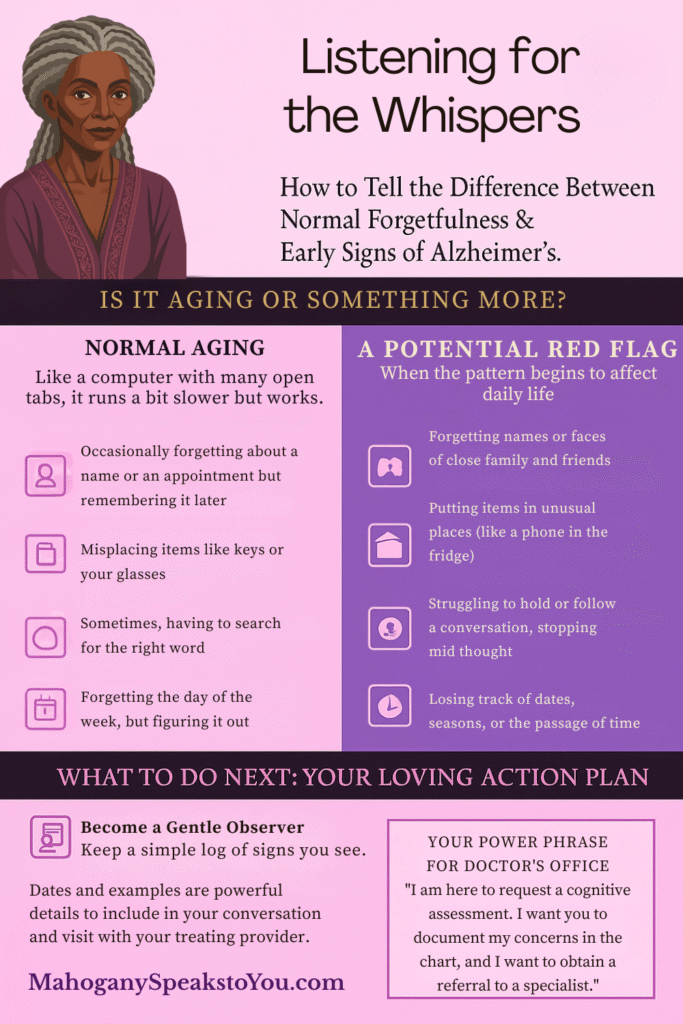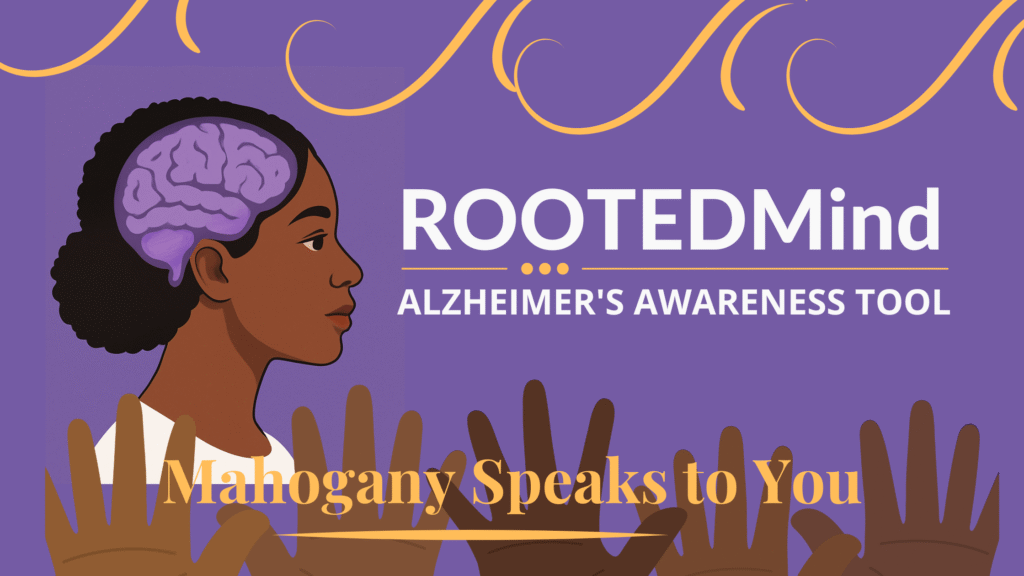
Let’s sit down and have one of those kitchen table talks. The kind where we get real about what’s on our hearts. Today, let’s talk about our minds. Let’s talk about Alzheimer’s in Black women. We’ve all had those moments. You walk into the living room purposefully, only to wonder, “Now, what did I come in here for?” Or you spend ten minutes searching for your glasses, only to find them perched on your head. That’s life. That’s normal.
But what about when the changes feel different? When your mother, who taught you how to cook, suddenly can’t remember the steps to her famous mac and cheese? Or when you find yourself telling your best friend the same story you told her an hour ago?
These moments aren’t just “senior moments.” They are quiet whispers from our brains asking for our attention. They are red flags. And for us, as Black women, who are so often diagnosed later when the disease is more advanced, learning to see these signs early isn’t just smart. It’s an act of radical self-love.
Listen to the Podcast
Normal Forgetfulness vs. A Brain Asking for Help
As we age, our brains change. It might take a little longer to recall a name or remember where we parked the car. Think of it like a computer with too many tabs open—it might run a little slower, but it still works perfectly.
But Alzheimer’s and other dementias are different. This isn’t about running slower; it’s about the computer’s hardware beginning to have problems. It affects more than just memory—it changes how we think, speak, make decisions, and see the world.
Let’s break down the difference with love and clarity:
| Normal Aging: The Brain’s Natural Rhythm | A Potential Red Flag: The Brain Under Stress |
| Forgetting which day of the week it is, but remembering later. | Losing track of the date, the season, or the passage of time. |
| Sometimes having trouble finding the right word for something. | Struggling to hold a conversation or stopping mid-sentence with no idea how to continue. |
| Misplacing your keys or your phone from time to time. | Putting things in unusual places, like the TV remote in the freezer, and not being able to retrace your steps to find it. |
| Making a bad decision once in a while, like forgetting to pay a bill. | Showing consistently poor judgment, especially with money, like falling for scams or giving away large sums. |
| Feeling a little down or moody sometimes. | Showing significant changes in personality, like becoming easily angered, fearful, suspicious, or withdrawn from loved ones. |
If the signs on the right side of this chart feel familiar for you or someone you love, it’s not a cause for panic. It’s a cause for action.

The Early Whispers: What to Listen For
Alzheimer’s doesn’t show up overnight. It often tiptoes in, disguised as stress or just a normal part of getting older. Here are the common early whispers to pay attention to:
- Memory Loss That Affects Daily Life: This isn’t about forgetting a single appointment. This is about forgetting important information you just learned, asking for the same details over and over, and increasingly relying on notes or family members to handle things you used to manage yourself.
- Losing Your Way with Familiar Tasks: This could look like having trouble driving to the grocery store you’ve been going to for 20 years, struggling to follow a familiar recipe, or not being able to manage a budget.
- A Change in Mood and Personality: A 2018 study highlighted that early, subtle symptoms can include apathy (losing interest in hobbies and activities) and anxiety. Does your normally social aunt now refuse to leave the house? Is your dad suddenly more irritable or easily upset? Pay attention to these shifts.
- Trouble with Words: This is more than searching for a word. It’s calling a watch a “hand clock” or struggling to name common objects, making conversations difficult to follow.
How the Signs Can Look Different for Us
As Black women, we are strong. We have to be. We’ve managed grief, stress, and burnout while holding our families and communities together. Because of this strength, we sometimes explain away the symptoms of Alzheimer’s.
Research shows that because of cultural factors and systemic bias, we are often diagnosed with more severe symptoms. This is because the early signs were missed or misunderstood. In our community, this might look like:
- Explaining it Away: We might say, “Momma’s just getting stubborn in her old age,” or “That’s just how Granny was.” We see it as a family trait instead of a medical condition.
- Behavioral Changes First: Studies, including findings presented at the Alzheimer’s Association International Conference, suggest that Black individuals may be more likely to present with behavioral symptoms like hallucinations or delusions earlier in the disease process compared to white patients.
- Trusting Your Gut: You know your loved one better than anyone. If their spirit seems different, if something in your gut tells you this is more than just aging, you are not overreacting. You are being observant.
What to Do When You Notice the Signs
If any of this sounds familiar, here is your loving action plan:
- Become a Gentle Observer. Keep a simple journal on your phone or in a notebook. Write down what you see. For example: “May 29th – Mom asked me three times this morning what we were doing today. Seemed confused.” This log is not for judgment; it’s powerful information for a doctor.
- Start the Conversation with Love. Talking about this can be scary. Lead with “I” statements and compassion, not accusation.
- Try saying: “I’ve noticed you’ve seemed a little more stressed lately, and I’m worried about you. How have you been feeling?”
- Or: “I love you, and because I love you, I want to make sure we’re both taking care of our health. I noticed a few things that I think we should talk to a doctor about together.”
- Demand a Thorough Evaluation. When you see a doctor, be firm and clear.
- Say: “I am here to request a cognitive assessment for myself (or my mother).”
- If a doctor says, “It’s just normal aging,” push back gently but firmly. Say, “Thank you for your opinion, but these changes are affecting daily life. Could you please document my concerns in the chart and refer us to a specialist, like a neurologist or geriatrician?”
Your voice deserves to be heard. Your concerns are valid.
Final Thoughts: Your Mind is a Legacy
Taking action is not about betraying a loved one or inviting bad news. It’s about honoring their legacy—and your own. Our minds hold our stories, our laughter, our strength, and our wisdom. Protecting them is the ultimate act of love.
Early detection doesn’t mean the journey will be easy, but you can walk it with more choices, support, and power. You can access treatments, join clinical trials, and make plans for the future with clarity and dignity.
Here at Mahogany Speaks to You, we see you, we hear you, and we are with you. By talking about this openly, we break the chains of silence and build a future where every Black woman can age with the grace and peace she so richly deserves.

ROOTEDMind™ Alzheimer’s Awareness Tool
Check any symptoms you’ve noticed for yourself or a loved one: